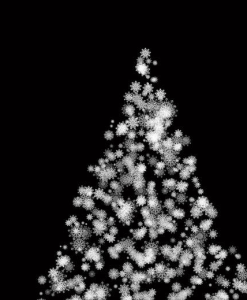Tag : christmas
December 31, 2019 by admin
On Christmas, and Confusion
Passing. There’s no time like the holidays for it. Passing plates. Passing on obligations and invitations. Passing by the Salvation Army jingles and tourists gawking at Macy’s holiday window displays. And passing by all the trees, wrapped up and dreaming of living rooms.
Suddenly, nothing is secular, so everything is secular. I usually don’t listen to music through headphones—music was made for orchestras and turntables and studios and theaters and speakers. But in December, I do. It’s cold, it’s lonely, and there’s a whole catalogue of carols written to address the temperature and the accompanying existential squall. And all the best songs were written by Jews, of course. So, I put in my headphones and join my ancestors and pass.
When I was in fifth grade, I wrote a report about Irving Berlin. I chose him randomly—I browsed the biography shelves after my immigrant parents, who had waited to get the internet until it became necessary, dropped me off at the library. I remember opening a book and seeing a menorah on the first page and reading something about his Russian roots. Perfect, I thought. He’s just like my dad, this’ll be easy. White Christmas meant nothing to me at the time—I didn’t see it until this year and only because I’ve been consumed by religious inversions recently.
Hanukkah wouldn’t exist without Christmas. It’s been plucked out of scriptural obscurity and magnified to give Jews something to do. Or rather, something to buy, should we not succumb to the cheerful Christmas monolith. I don’t mean to deride the monolith—I mean to define it. I mean to trace its edges and describe its shape in a way that only certain kinds of outsiders can. Jews occupy a particular intersectional niche: we are frequently able to pass and comment both from the inside and the outside on what we see.
- No Comments
December 20, 2018 by admin
An (Almost) Christmas Carol
Christmas was not an important day for me. As a Jewish child, growing up in a small  Connecticut town, I was certainly aware of the holiday and of its significance, but early on I knew that it was not my holiday and that my role in this season was that of onlooker. To say that I didn’t envy my friends’ excitement and anticipation every December, or that I didn’t wake up on Dec. 25 feeling somewhat empty and isolated would be untrue. But, like every other Jewish child from that era, I became something of a philosopher at an early age. That was theirs, not mine. It was a bit sad but not tragic. I would enjoy this holiday vicariously, admiring my friends’ trees and lights, and helping them play with their new toys.
Connecticut town, I was certainly aware of the holiday and of its significance, but early on I knew that it was not my holiday and that my role in this season was that of onlooker. To say that I didn’t envy my friends’ excitement and anticipation every December, or that I didn’t wake up on Dec. 25 feeling somewhat empty and isolated would be untrue. But, like every other Jewish child from that era, I became something of a philosopher at an early age. That was theirs, not mine. It was a bit sad but not tragic. I would enjoy this holiday vicariously, admiring my friends’ trees and lights, and helping them play with their new toys.
At the same time, Hanukkah was not widely celebrated. Where today many parents treat Hanukkah as a Jewish substitute for Christmas, in those days, in poor rural towns, it wasn’t directly compared to its Christian counterpart. It is a minor Jewish celebration, important in its affirmation of freedom of thought and religion, but not the occasion for massive gift-giving modern American parents have made it today.
- No Comments
 Please wait...
Please wait...